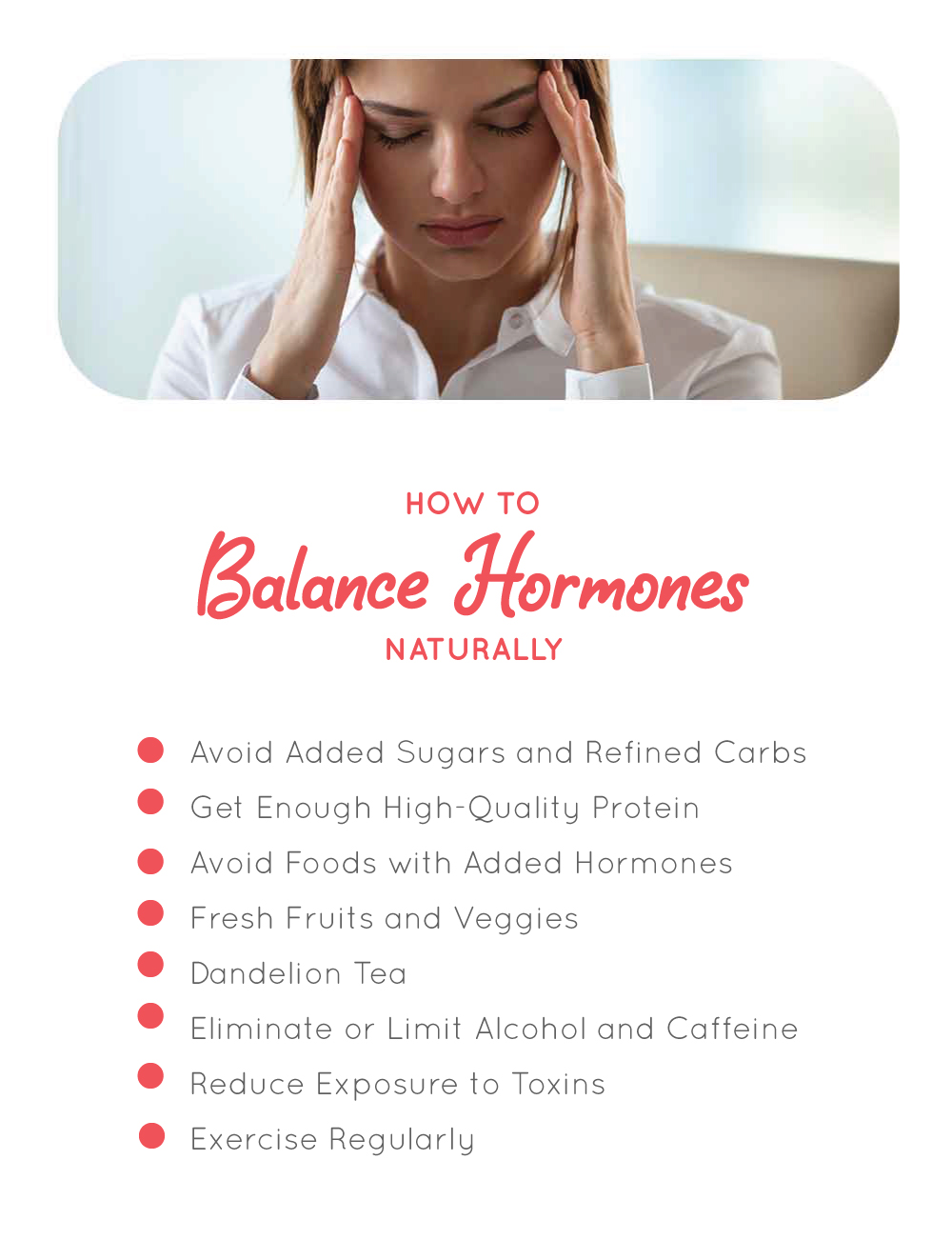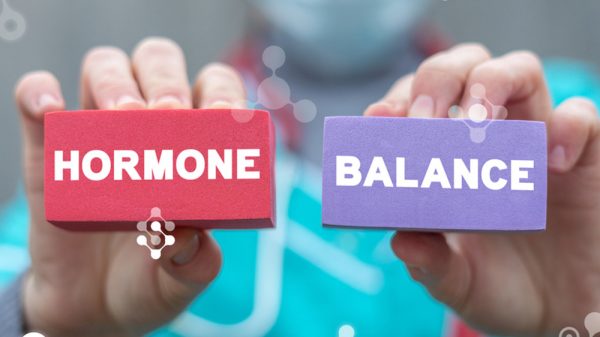Women go through numerous hormonal fluctuations each month that are normal and prepare the body to conceive a child. These hormonal cycles depend on the careful balance of sex hormones. Interestingly, fatty liver disease is associated with a higher likelihood of having hormone imbalances.
Find out about hormonal imbalance symptoms in women and how hormones are connected to fatty liver disease. You can make certain diet and lifestyle changes to help restore hormone balance and support liver health.
Estrogen, Progesterone, and Testosterone: The Role of Sex Hormones in Women
Hormones are often referred to as the body’s chemical messengers that communicate among cells and regulate organ activity. The primary sex hormones in women are estrogen and progesterone. Though testosterone is usually referred to as a male sex hormone, it is also produced in females. All three of these sex hormones are referred to as steroid hormones and must be present in ideal amounts for optimal reproductive and hormonal health.
Estrogen
Estrogen is responsible for driving the development of female organs and defining female characteristics. Estrogen also plays a critical role in the menstrual cycle. An increase in estrogen levels in the menstrual cycle facilitates the activity of the luteinizing hormone, which initiates the release of an egg from the ovary in a process called ovulation. Estrogen also contributes to the thickening of the uterine lining to prepare for implantation.
There are generally three forms of estrogen: estradiol, estradiol, and estrone. The ovaries are the primary estrogen factories in the body, and the liver is responsible for metabolizing estrogen.
Progesterone
Progesterone is another hormone produced in the ovaries and adrenal glands. Progesterone influences breast development and triggers menstruation during the menstrual cycle. High levels of progesterone are often blamed for bothersome symptoms during premenstrual syndrome (PMS). Does progesterone cause weight gain? Not directly, but changes in hormones and hormonal imbalance can affect metabolism and appetite, which results in weight gain.
Testosterone
Testosterone is present in females, though in smaller amounts than is present in males. The ovaries and adrenal glands are responsible for producing testosterone. In women, testosterone is used to regulate the repair of reproductive organs and regulate sex drive.
Interestingly, estrogen, progesterone, and testosterone play important roles not only in regulating reproductive function but also in regulating behavior, neurological activity, and metabolism.
Hormone Levels Change with Age
Beginning in puberty and throughout child-bearing age, women naturally have higher levels of estrogen and progesterone. During middle age, women experience menopause, which causes a natural decline in hormone levels. Women going through menopause will experience decreases in estrogen, progesterone, and testosterone.
Symptoms of Hormone Imbalances
Hormone levels that are too high or too low can result in unpleasant symptoms that have a detrimental effect on reproductive health, as well as overall health. Let’s take a look at the signs and symptoms of hormonal imbalances. Keep in mind that there is some overlap across the symptoms.
High Progesterone or Low Progesterone?
High progesterone is often the cause of the dreaded symptoms associated with PMS. High progesterone symptoms include:
- Mood swings
- Breast pain or tenderness
- Water retention or bloating
Low progesterone is common among women going through menopause. Low progesterone symptoms include:
- Dry skin
- Hot flashes
- Night sweats
- Low libido
- Development of fibroids
- Endometriosis
High Estrogen or Low Estrogen?
The symptoms of high estrogen may differ from symptoms of low estrogen.
Symptoms of high estrogen (also known as estrogen dominance) include:
- Fatigue
- Endometriosis
- Fibroids
- Bloating
- Weight gain
Symptoms of low estrogen include:
- Extreme hunger and cravings
- Headaches
- Vaginal dryness
- Heart palpitations
- Increased heart rate
High Testosterone or Low Testosterone?
High testosterone symptoms include:
- Growth of facial hair, or hirsutism
- Weight gain
- Hair loss
- Severe cystic acne on the jawline
- Irregular periods
- Infertility, in severe cases
Low testosterone symptoms include:
- Low sex drive
- Lack of muscle tone
- Depression
- Brain fog
Causes of Hormonal Imbalances
Your primary care physician, gynecologist, and/or endocrinologist can measure your hormone levels by administering a blood test. He or she can diagnose your specific case of hormonal imbalance, determine underlying causes, and provide treatment options.
It’s important to point out that to a certain extent, symptoms of hormone fluctuations are a natural part of the menstrual cycle, pregnancy, and menopause. However, if symptoms are bothersome or you suspect an underlying problem, it’s always a good idea to contact your doctor.
A number of conditions can throw off your hormone balance.
- Polycystic ovary syndrome (PCOS): PCOS is a hormonal condition primarily affects young women of child-bearing age and is characterized by high testosterone.
- Hyperthyroidism: An overactive thyroid gland may play a role in increasing testosterone
- Hypothyroidism: An underactive thyroid gland may contribute to a decrease in sex hormones.
- Adrenal gland issues: Since estrogen, progesterone, and testosterone are all produced in small amounts in the adrenal glands, extreme stress or conditions affecting the adrenal gland function may result in hormonal imbalances.
- Pituitary gland issues: The pituitary gland plays a role in regulating all endocrine activities by secreting hormones- like a follicle-stimulating hormone, thyroid-stimulating hormone, and luteinizing hormone- that impact thyroid and reproductive hormones.
Environmental factors connected to diet, stress levels, and lifestyle can also have a significant impact on hormone levels.

Treating Hormonal Imbalance
If you are of child-bearing age, birth control pills can help supply your body with steady hormone levels, regulate your cycle, and help reduce symptoms associated with fluctuating hormones. Physicians may prescribe hormone replacement therapies for menopausal and post-menopausal women.
Regardless of the cause of hormonal imbalances, making diet and lifestyle changes can positively influence your hormonal health and help restore hormone balance.
How Are Hormonal Imbalances Related to Fatty Liver Disease?
It turns out that sex hormones and liver function are closely related.
In particular, high testosterone and low estrogen in women seems to be directly related to fatty liver disease. Research shows that having optimal levels of estrogen helps regulate the metabolism and storage of fat in the liver. Having enough estrogen is also critical for moderating the cholesterol levels by increasing high-density lipoprotein (good cholesterol) and decreasing levels of low-density lipoprotein (bad cholesterol). Conversely, lower levels of testosterone in women are correlated with less inflammation, lower prevalence of polycystic ovary syndrome (PCOS), and lower risk of fatty liver disease. (1)
PCOS is a hormonal disorder that results in high testosterone in women and is associated with weight gain, metabolic syndrome, acne, abnormal menstruation, and infertility. PCOS is significantly associated with a greater risk of developing fatty liver disease.
Post-menopausal women tend to be more at risk for developing fatty liver disease than premenopausal women and also seem to be at a higher risk for the progression of fatty liver disease to more serious conditions like steatohepatitis, fibrosis, and cirrhosis. This is in large part due to estrogen levels markedly declining, starting in perimenopause and continuing throughout menopause. The dominant form of estrogen in premenopausal women is estradiol, which exerts strong liver-protecting effects. In contrast, the dominant form of estrogen in post-menopausal women is estrone, which exhibits much fewer liver-protecting effects. (2)
How to Balance Hormones Naturally
Diet and lifestyle changes can help counteract hormonal imbalances. The endocrine system is not an isolated system and is extremely sensitive to imbalances in metabolic health and cardiovascular health.
The following suggestions will help cleanse your system of irritants and inflammatory agents that exacerbate hormonal fluctuations.
1. Avoid Added Sugars and Refined Carbs
Fluctuating blood sugar levels disturb your body’s homeostasis. When blood sugar levels rise rapidly, the body is required to immediately respond and work to clear glucose from the blood and deliver it to cells. The hormone insulin is responsible for signaling cells to use available glucose to power necessary processes. Over time, however, consistent consumption of large amounts of sugar and refined carbs leads to insulin dysfunction. The body becomes less sensitive to insulin. Interestingly, insulin resistance is tied to other imbalances in hormones, including high testosterone.
2. Get Enough High-Quality Protein
The building blocks of dietary protein – amino acids – are also the building blocks of hormones, neurotransmitters, and muscle tissue. Eating enough protein with optimal ratios of amino acids ensures that your body has the starting materials it needs to synthesize all of these compounds.
Sources of high-quality protein that provide all essential amino acids include lean meats like chicken and fish, low-fat dairy, and soy products like tofu. Vegetable sources like nuts, seeds, whole grains, and beans also provide lots of protein but must be combined throughout the day to reach an optimal level of essential amino acids.
3. Avoid Foods with Added Hormones
Meat and dairy products are often filled with growth hormones that have been given to animals to increase their muscle growth. Animals may also be supplemented with progesterone, testosterone, and estrogen to influence growth and milk production. Consuming these hormones through food may interfere with your natural levels of hormones.
To avoid added hormones, consume lower amounts of meat and dairy and choose products that are organic.
4. Fresh Fruits and Veggies
Fresh fruits and vegetables are filled with fiber, vitamins, minerals, and antioxidants. The nutrients in produce help to quell systemic inflammation resulting from the physiological stress response. Eating fruits and vegetables helps your endocrine system protect against irritants and inflammatory agents that may contribute to hormonal imbalances.
Fruits and vegetables are also high in polyphenols that exhibit antioxidant activity and help reverse oxidative damage. Oxidative damage occurs from waste product accumulation from cellular processes, inflammatory damage from stress, or exposure to environmental toxins. As a result, reactive species build up in cells and impede healthy functioning. Potent antioxidant compounds in plants are able to clean out reactive species, facilitate cellular repair, and help encourage optimal functioning of all organ systems including the endocrine system and liver.
Great options for fruits and veggies with anti-inflammatory and antioxidant agents include kale, spinach, broccoli, blueberries, blackberries, cherries, and oranges.
5. Dandelion Tea
Dandelion is known for its liver-cleansing effects and its ability to balance hormones. Plus, studies suggest the hormone-balancing impacts of dandelion tea. Researchers at Capital Medical University in Beijing, China, found that dandelion extract may play a role in facilitating the production of steroid hormones and increasing reproductive function. (3)
Dandelion greens can be bought at your local supermarket and used for salads. Roasted dandelion root tea is another way to get dandelion’s hormone-balancing effects.
6. Eliminate or Limit Alcohol and Caffeine
Excessive alcohol or caffeine intake artificially activates or suppresses endocrine activity. Caffeine intake may activate the adrenal glands and cause imbalances in hormones. Alcohol disrupts communication across the entire endocrine system, including the hypothalamus, pituitary glands, adrenal glands, thyroid glands, and gonads. (4)
7. Reduce Exposure to Toxins
The endocrine glands are extremely sensitive to the presence of foreign particles such as cigarette smoke, allergens, and environmental pollutants. Consuming pesticides or breathing in smog from traffic can result in oxidative damage and erratic endocrine activity that could lead to hormonal imbalances. When possible, try to buy organic food and thoroughly rinse nonorganic foods to remove extra pesticides that may be present.
8. Exercise Regularly
Exercise is critical to improving metabolic function. Regular aerobic exercise and strength training helps lower blood pressure, improve cholesterol levels, and improve insulin sensitivity. Regular strength training contributes to muscle mass, improves resting metabolic rate, and helps create a calorie deficit that aids weight loss. Moreover, exercise helps relieve stress and lower systemic cortisol, which can effectively balance sex hormones.
9. Manage Stress
Stress can have massive impacts on your adrenal glands, which can cause cortisol levels to rise and in turn wreak havoc on the careful balance of estrogen, progesterone, and testosterone in the body. Some women may notice the manifestations of stress in their menstrual cycles. Extreme and chronic stress in some cases can lead to irregular periods or missed periods. Being subjected to constant stress may even acutely impact your ability to get pregnant.
Stress impacts nearly all organ systems, from endocrine function to liver health. You can manage stress by following a regular sleeping schedule and engaging in stress-relieving activities. Try incorporating journaling, yoga, meditation, reading, or deep breathing exercises into your daily routine.
Conclusion
Many hormonal fluctuations are a natural part of life and are accompanied by uncomfortable but manageable symptoms. However, more serious hormonal imbalances in women often manifest in ways that affect your menstrual cycle, mental health, and fertility, as well as overall health and quality of life. If you have fatty liver disease, you are at a greater risk of also having hormonal imbalances. If you are experiencing any of the signs of hormonal imbalance discussed above, make an appointment with your physician to determine whether you have a hormone imbalance. Medical treatments combined with diet and lifestyle changes can effectively help restore hormone balance while simultaneously enhancing liver health.

References:
(1) https://www.ncbi.nlm.nih.gov/pmc/articles/PMC4600502/
(2) https://www.ncbi.nlm.nih.gov/pmc/articles/PMC4491951/























